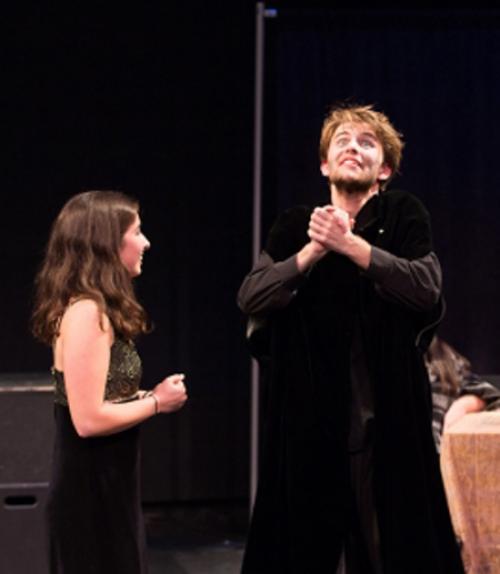Griffin Smith-Nichols ’19 spent three nights last week cowering on a set of lounge chairs in the Schwartz Center’s Black Box Theatre. The Arts and Sciences student played the slightly mad, mostly murderous and often humorous Orestes in this semester’s Department of Classics production of the Euripides play.
The play, filled with maniacal rants, lots of fake swords and sabers and a few Southern accents, was directed by classics professor Frederick Ahl and featured students from his Theater in Performance course. It ran Nov. 16-18.
“I wanted this play to speak to a modern audience, but without changing what Euripides was saying,” Ahl said. “People have their own notion of what tragedy ought to be, but this play is what the ancient Greeks meant by tragedy. Euripides was a great humanist and saw the paradox of all of this, the juxtaposition of laughter and intense grief and the nature of insanity.”
The story of “Orestes” focuses on the main character and his sister, Electra, shortly after Orestes has murdered his mother, Clytemnestra, and her lover to avenge the murder of his father, Agamemnon, king of Argos. Orestes is tormented by demons and is set to be executed, along with Electra, for his crimes. The pair seek help from an uncle, Menelaus; are lambasted by their grandfather, Tyndareus; and eventually hatch a plan to kill their mother’s sister, Helen, and destroy the palace. Only Apollo, who admits that he ordered Orestes to kill Clytemnestra, saves them in the end. Apollo also manages to clean up several messy romantic liaisons that have sprung up during the play.
“Athens was an amazing society because they were obsessed with two things: legal procedures and theater,” said Xenia Ludtseva ’18, who played Apollo and a member of the chorus. “And this is such a complex play because we are dealing with high classical Athens and have this dilemma of Gods versus men.” Ludtseva, a classics major and government minor, said the play also explores power and the nature of democracy.
“Orestes” was first performed in 408 B.C., and was perhaps the best-known and most popular tragedy in antiquity, Ahl said. Cornell students performed a modern translation of the play by William Arrowsmith, who was a professor of classics at the University of Texas at Austin and Boston University.
“It’s such a dense mythos you’re being thrown into,” Smith-Nichols said. “I really thought about what would happen if I was in that situation. If I had done something where I was compelled to kill my mother, how would I act around other people? I tried to internalize that conflict.
“I did end up sympathizing with Orestes a lot, even through he is physically, morally, and in other ways, just repulsive,” Smith-Nichols said. Working on the play also gave him a deeper understanding of what to expect in Greek tragedies, he said.
This story also appeared in the Cornell Chronicle.




